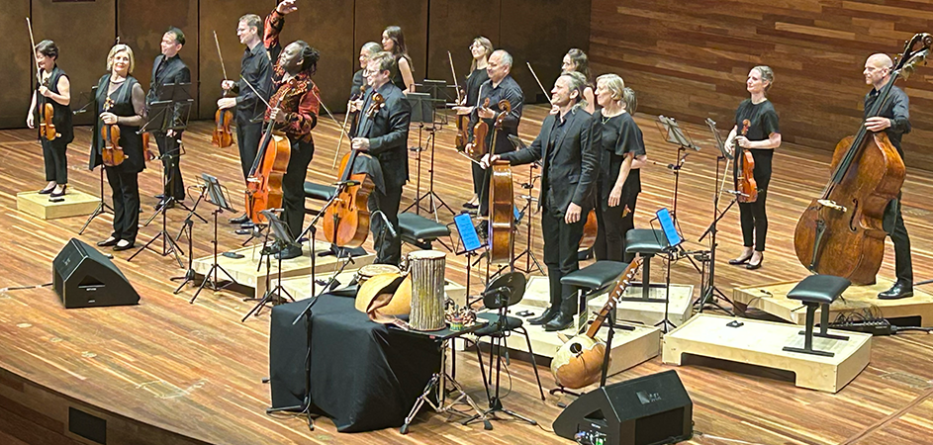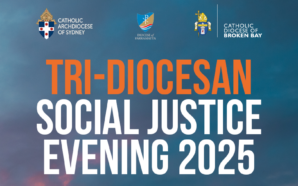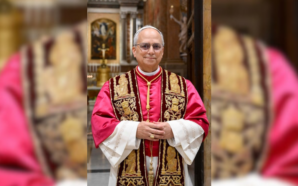Homily for Easter Sunday
20 April 2025
Romans 6:3-11; Psalm 117; Luke 24:1-12
Listen to the full homily on Soundcloud
In the Exsultet on Easter night, the priest sings: ‘The sanctifying power of this night dispels wickedness, washes faults away, restores innocence to the fallen, and joy to mourners, drives out hatred, fosters concord, and brings down the mighty.’
On Palm Sunday I had the good fortune to attend a concert with the Australian Chamber Orchestra accompanying the South African cellist Abel Selaocoe. As a child, Selaocoe used to travel in overcrowded trains from Soweto into Johannesburg. The New York Times described the scene thus: ‘Traveling to class on a packed train, on which passengers resorted to standing in the spaces between carriages, Selaocoe would remove the bridge of his cello, take off the endpin and put both parts in his pocket, standing with the instrument flat against his chest to take up as little space as possible. He began playing on a shared instrument, before teachers spotted his potential and gifted him his own.’[1]
Abel was born in the same month that white South Africans voted at referendum to put an end to apartheid. Both church and music were important influences on Abel, as they were for many Black South Africans emerging from the apartheid regime. The crowded all Black train journey each day was sometimes described as the Train Church. Back in 1986, the South African photographer Santu Mofokeng produced a photographic exhibition with that name as ‘an ode to Black commuters who prayed as they rode on packed passenger trains that shuttled them back and forth between their homes in Soweto and the centre of Johannesburg, where they were employed in menial jobs legislated for them by the apartheid regime. In one photo a preacher holds his Bible open; in another a woman stands with her mouth wide in religious ecstasy’. Mofokeng said the photos captured ‘the experience of commuting and the pervasiveness of spirituality’.[2]
Abel now commutes on the world stage and ‘he doesn’t need to worry about how much space he takes up’. He had the usually staid Australian Chamber Orchestra singing with gusto and almost dancing as they would never do on their own. He wowed the audience with his joy and hope, speaking of the universal appeal of music. At the end of the concert, everyone in the packed theatre gave a standing ovation. We were filled with Easter joy. One of my family who shared the concert with me brought to my attention the Irish novelist Niall Williams’ book This is Happiness in which he writes:
It seems to me the quality that makes any music worthwhile is life, just that. Music is not life, can never be as full, rich, complex, surprising or beautiful, but the best of it can catch an echo of that, can turn you back to look out the window, go out the door aware that you’ve been enriched, that you’ve been in the company of something alive that has caused you to realise once again how astonishing life is, and you leave the concert hall with that illumination, which feels I’m going to say holy, by which I mean human raptness.[3]
Selaocoe shared with us his journey of hope and the sanctifying power of his music which dispelled wickedness, washed faults away, restored innocence to the fallen, and joy to mourners, driving out hatred, fostering concord, and bringing down the mighty.
God knows, we all need something of that this Easter: troubled as we are by the endless wars in Gaza and Ukraine imposing indiscriminate death and destruction, not on the combatants but on the innocent bystanders; troubled as we are by the seeming collapse of the rules based international order and of the globalised free market; troubled as we are by the pervasive pessimism in Australian society despite this being one of the best places in the world to live. Social researcher Rebecca Huntley traces our pessimism to our isolation and lack of connectedness.[4]
As Easter Christians we are not necessarily transformed from being pessimists to optimists. That may be more a function of mood or intelligent assessment of our social, political and economic circumstances. As Easter Christians, we exude that quality on stage of Ablel Selaocoe – hope and joy, in the midst of struggle and despair. Why? Because in Jesus the risen one, we are no longer isolated and disconnected. We are faithfully connected with our God; we are lovingly connected with our deceased loved ones; we are tangibly linked with the Christian community coming to the table of the Eucharist, and we are linked in solidarity with those, of many faiths and none, who are seekers for justice, mercy and truth.
Pope Francis put it well when he promulgated the decree for this Jubilee Year. He said:
The storms that buffet us will never prevail, for we are firmly anchored in the hope born of grace, which enables us to live in Christ and to overcome sin, fear and death. This hope, which transcends life’s fleeting pleasures and the achievement of our immediate goals, makes us rise above our trials and difficulties, and inspires us to keep pressing forward, never losing sight of the grandeur of the heavenly goal to which we have been called.
Speaking of our hope in God as the hope that does not fade, Francis thinks this might help us ‘to recover the confident trust that we require, in the Church and in society, in our interpersonal relationships, in international relations, and in our task of promoting the dignity of all persons and respect for God’s gift of creation.’[5]
Happy Easter!
Give thanks to the Lord who is good;
the mercy of the Lord endures for ever.
Let Israel now proclaim,
‘The mercy of the Lord endures for ever.’
The mighty hand of the Lord has triumphed!
the mighty hand of the Lord is exalted!
the mighty hand of the Lord has triumphed!
I shall not die, but live,
and declare the works of the Lord.
Fr Frank Brennan SJ is serving as part of a Jesuit team of priests working within a new configuration of the Toowong, St Lucia and Indooroopilly parishes in the Archdiocese of Brisbane. Frank Brennan SJ is Adjunct Professor of the Thomas More Law School at ACU and is a former CEO of Catholic Social Services Australia (CSSA). Fr Frank’s latest book is An Indigenous Voice to Parliament: Considering a Constitutional Bridge, Garratt Publishing, 2023 and his new book is ‘Lessons from Our Failure to Build a Constitutional Bridge in the 2023 Referendum’ (Connor Court, 2024).
[1] See https://www.nytimes.com/2022/09/23/arts/music/abel-selaocoe.html.
[2] See Program notes, p.17, available at https://www.aco.com.au/whats-on/2025/abel-selaocoe.
[3] Niall Williams, This is Happiness, Bloomsbury, 2020, p 73.
[4] Listen at https://www.theguardian.com/australia-news/audio/2025/apr/15/rebecca-huntley-on-the-threat-to-democracy-of-isolation-and-distrust-full-story-podcast
[5] See https://www.vatican.va/content/francesco/en/bulls/documents/20240509_spes-non-confundit_bolla-giubileo2025.html








